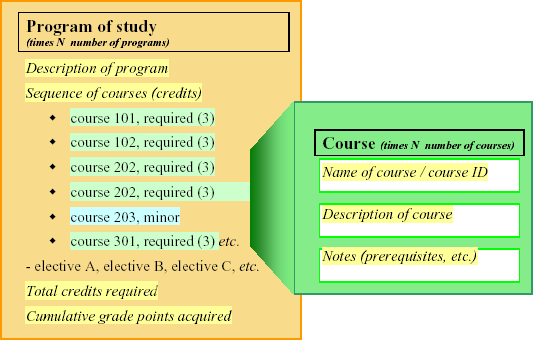A Brief Foray into Structured Content (a.k.a. XML)
Whenever we talk about eXtensible Markup Language (XML), we are talking about some kind of "structured content." In case you haven't been exposed to these concepts, we take a brief look at them before we dive further into XML and InDesign.
The first concept is that of structure, sometimes called "hierarchy." This is the organization of pieces of information into a grouping that makes sense to humans. For example, if you are going to describe a course within a college course catalog, at minimum you would give the course name and a brief description. To relate this course to the larger picture of getting a degree, you would want to provide information about the major that the course is part of, tell the prospective student how many credit hours the course counts for, and provide information about the prerequisites, if there are any.
Looked at from the top down, a college offers programs of study consisting of courses in a sequence. Course credits have to add up to the required number for the degree program.
If you draw the relationships as boxes that contain information, you might see that a program of study contains a set of repeating information blocks consisting of blocks of course names and descriptions, like this:

Figure 1. A diagram of a possible course catalog structure
The second concept is "semantics," which is applying names to ...
Get XML Publishing with InDesign CS2+ now with the O’Reilly learning platform.
O’Reilly members experience books, live events, courses curated by job role, and more from O’Reilly and nearly 200 top publishers.

